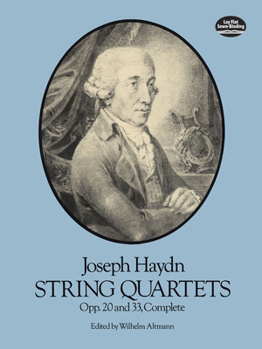String Quartets, Opp. 20 and 33, Complete
"Of the symphony he may be said with truth to have enlarged the sphere . . . enriched and developed the capacities with the versatility of true genius . . . the quartet he also brought to perfection." -- Grove's Dictionary of Music and Musicians
Mozart's best friend and Beethoven's teacher, Joseph Haydn (1732-1809) was not only the first of the three great masters of the Viennese classical school -- but its principal founder. From the close of the baroque period to the advent of romanticism, his creative activity bridged a half-century of profound revolution in music, and there is scarcely an area in which his influence is not to be felt.
But it is in the string quartet that Haydn's originality, inventiveness, and craftsmanship found their most natural mode of expression. During 50 prolific years, he composed over 80 string quartets (the exact number is still in question), practically inventing the four-movement structure and elevating the form to a new pinnacle. "It was from Haydn," said Mozart, "that I first learned the true way to compose quartets."
In this fourth volume of Haydn's string quartets, Dover completes republication of the composer's major achievements in the form. Full scores of the 12 masterful quartets (six each) of Opp. 20 and 33 exemplify the range and variety of structural invention he brought to the genre. Composed in 1781 and dedicated to the Russian Grand Duke Paul, Op. 33 contains such favorites as the "Joke" and the "Bird" quartets, while the quartets of Op. 20 (1771) are among the most performed and recorded pieces in the repertoire.
Music students, musicians, and Haydn fans will find this inexpensive volume an important addition to their libraries. Large, readable noteheads and ample space for notations and analysis make this a splendid study edition -- a treasury of 12 works that clearly demonstrate Haydn's supreme mastery of the form.
Related Subjects
Arts, Music & Photography Chamber Music Instruments Music Musical Genres Opera Songbooks Strings





